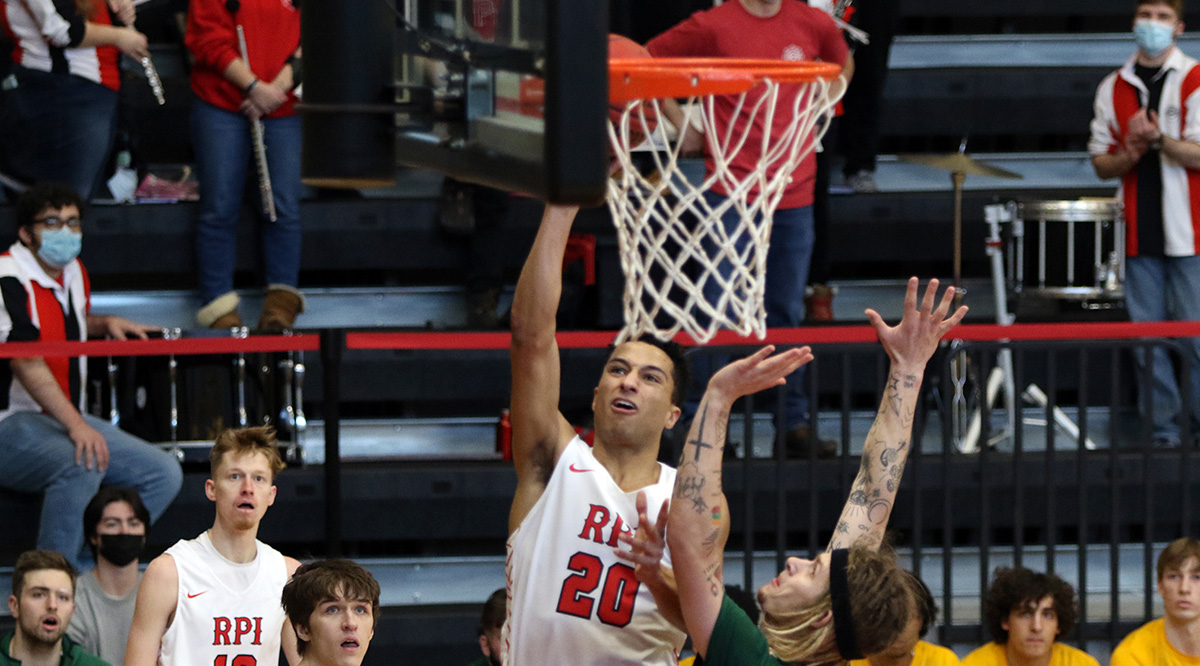
|
| RPI's trip to the Sweet 16, not to mention Dom Black's elevation, isn't as unbelievable as the faces in the lower left make it seem. RPI athletics photo |
By Ryan Scott
D3hoops.com
For most people, the term ‘Engineer’ conjures images of someone even-keeled, calm, analytical – somebody you’d expect to roll with the punches. Although they’re not all actual engineers – about half the team majors in business and management – the men of Rensselaer Polytechnic Institute largely live up to the stereotype. They’ve been through a relatively turbulent season, but you’d never know it from their approach to the game.
“Sometimes midseason adversity can make you stronger at this point in the year,” notes coach Mark Gilbride, whose squad has parlayed a Pool C selection into a trip to Randolph-Macon for the second weekend of the NCAA Tournament. “That we were missing people allowed others to step up and grow. Will Fredericks wasn’t getting a lot of time at the beginning of the season, but he’s our sixth man now; Avery Eugster stepped in to start against Wesleyan.”
Emerging from the pod at Wesleyan was no easy feat, but RPI put everything together to squeak out a one-point victory against the hosts in the second round. Senior Mason Memmelaar sums it up this way: “Of course rebounding is important. Boxing out, especially against teams bigger than us, is huge, but we also focus on offense, getting shots that we want. When we play the game at our pace, it feels so natural.
Memmelaar and company shot 49% from the floor against Wesleyan, which helped make up for a rebounding disadvantage, something that’s plagued RPI through most of its five losses this season. “Rebounding has been a big advantage for us most of the season,” says Gilbride. “In games where it hasn’t been, that makes things a lot tougher on us.”
Also tough is not ever knowing who’s going to be on the floor from night to night. Beyond the typical COVID issues this year, the early months of RPI’s season were plagued with minor injuries that kept the lineup inconsistent. That, coupled with the rust of an entire lost season, made the early going rough.
“The guys did a good job getting stronger,” notes Gilbride. None of the Engineers took a gap year, but they weren’t able to do much of any regular practice. “There was a lot of outdoor basketball, which makes you tougher. Normally it takes a week or so for everyone to get into the rhythm of a new season, but this year it was more like three or four, plus you had two classes of players who had never played college basketball before.”
“It was a slower start conditioning-wise,” adds Memmelaar, “but we were mentally prepared and excited to be out there. Knowing basketball can be taken away at any time makes you determined to make the most of it.”
One of the biggest boosts was when All-American Patrick Mahoney decided to do grad school at RPI and was able to return for one more season. A versatile forward who can shoot the three well, Mahoney gives the team a lot of cover, especially because they don’t go super deep into the bench.
But just as things were coming together in early February, Mahoney was lost for the season to a torn achilles. “Obviously [losing Mahoney] was very upsetting,” says Memmelaar. “You hate to see the guy who comes back for one last year go down like that. He’s around. He travels with us, so we see him and we want to work hard and leave it all out on the court, because you never know when it will be your last game. We’ve learned that no matter which five is out there, you have to work together and play our best every game.”
A full team effort is key to what RPI does on both ends of the floor. They’ve allowed 70 points in regulation just twice this season and opponents average just 58, which was, incidentally, Wesleyan’s total in round two.

|
| Mason Memmelaar has shouldered more of the load for RPI, scoring 17.3 points per game since Patrick Mahoney's injury. RPI athletics photo |
Of course, the Engineers weren’t even sure they’d be in the tournament. After losing in the Liberty League semifinals, they had to wait until the very end of the bracket reveal. RPI was the last at-large team announced.
“It was nervous!” says Gilbride. “We had a great regular season and some big wins, we thought we put ourselves in a good spot. Then you realize how many teams across the country had really good seasons and not everyone is going to make it.”
Make it, they did – and made the most of it. Next up for RPI is WPI at Randolph-Macon – some Polytechnic-on-Polytechnic action for the Sweet 16. And while an eight-hour bus ride down the east coast is not many people’s idea of fun, Memmelaar is excited.
“It was nice being so close to home last weekend,” he says. “A lot of our family got to come, but I told coach I really hope we can travel during this experience, so I’m looking forward to going to Virginia. It should be fun.”
WPI is, in many ways, quite similar to RPI, and not just in academic focus. Both teams are defensive minded and will crash the boards hard. They’ll be happy to play a similar pace and it’s likely to come down to execution and who can minimize mistakes. RPI lost twice to Skidmore this year, a conference foe who brings a lot of size, not unlike the two All-NEWMAC post players they’ll face from WPI.
“We won’t have the butterflies,” says Memmelaar, who was on RPI’s tournament team in 19-20. “For those of us who’ve been though it before, we know what to expect and how to pass that on to the young guys.”